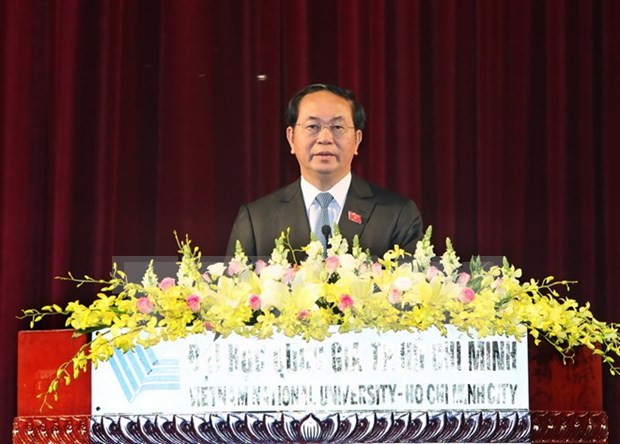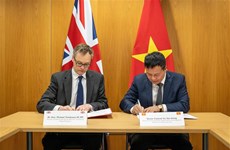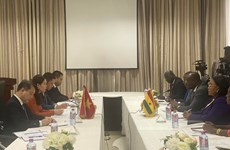President highlights growth opportunities from Industry 4.0
State President Tran Dai Quang has asked the Ho Chi Minh City-based National University to work to become a “modern university city” that nurtures the talents and optimises creativity of students.
 President Tran Dai Quang addresses the ceremony (Photo: VNA)
President Tran Dai Quang addresses the ceremony (Photo: VNA)There, the President discussed the fourth industrial revolution with its growth opportunities and non-traditional challenges.
The term “fourth industrial revolution” or “Industry 4.0” was introduced for the first time at the Hannover Fair in Germany in 2011. In 2012, the term was used to name a support programme of the German Government in association with the country’s leading industrial associations to improve the production and management process in manufacturing sectors through computerisation.
The State leader viewed that the revolution will exert strong influences on production, stimulating the economic transformation towards a knowledge-based and smart economy.
New scientific and technological advances will be applied to optimise production, distribution, consumption and management process, he said, adding that the movement will also generate positive impacts on consumption and prices.
For society, the revolution will help transform the labour structure in many countries with the introduction of creative classes in science, technology, design, culture, art, entertainment, education, training, health care and legislation, he said.
In the middle and long terms, sectors using intensive low-skilled labourers will be most affected, as the demand for the skilled will rise, he asserted.
President Quang also pointed out that Industry 4.0 is creating fresh opportunities for Vietnam to integrate into the world in a more extensive and effective manner, enabling it to adapt itself to new industrial sectors, and making the best use of scientific and technological advances to speed up industrialisation and modernisation and narrow down its development gap.
However, the President also highlighted immense challenges, particularly to the workforce and the manufacturing industry.
He cited a report by the International Labour Organisation released in July this year as saying that up to 86 percent of labourers in the apparel and footwear sectors are facing risks of unemployment due to impacts of technology breakthroughs brought about by the fourth industrial revolution.
The State leader underscored the necessity of having a suitable strategy to tap positive effects and overcome challenges generated by the revolution.
At the same time, he stressed non-traditional security challenges from Industry 4.0 to Vietnam, especially cyber security.
Vietnam is among countries with the fastest Internet development speed in the world, which poses latent risks to threaten the national security and social order.
Ensuring safety and security of the national information network, and preventing and combating cyber crimes are the struggle of all people under the leadership of the Party and are responsibility of the entire political system at all levels, he said.
He asked the National University-Ho Chi Minh City to be creative in teaching, studying, and researching viewpoints, guidelines, plans and policies of the Party and State on education and training.
The university should act to gather exceptional minds from the circle of scientists, researchers and lecturers in making it a “modern university city” where the country’s talents are nurtured and creativity of students optimised.
The National University-Ho Chi Minh City is an education-training and research complex that comprises 35 member units and subsidiaries, including six top universities in the southern region, one research institute and 28 subsidiaries in five areas of science, technology, society, economics and health science.-VNA













